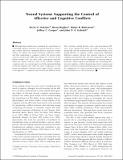Neural Systems Supporting the Control of Affective and Cognitive Conflicts
Author(s)
Ochsner, Kevin N.; Hughes, Brent; Robertson, Elaine R.; Cooper, Jeffrey C.; Gabrieli, John D. E.
DownloadOchsner-2009-Neural Systems Supporting the Control of Affective and Cognitive Conflicts.pdf (310.1Kb)
PUBLISHER_POLICY
Publisher Policy
Article is made available in accordance with the publisher's policy and may be subject to US copyright law. Please refer to the publisher's site for terms of use.
Terms of use
Metadata
Show full item recordAbstract
Although many studies have examined the neural bases of
controlling cognitive responses, the neural systems for controlling
conflicts between competing affective responses remain
unclear. To address the neural correlates of affective conflict
and their relationship to cognitive conflict, the present study
collected whole-brain fMRI data during two versions of the
Eriksen flanker task. For these tasks, participants indicated
either the valence (affective task) or the semantic category
(cognitive task) of a central target word while ignoring flanking
words that mapped onto either the same (congruent) or a different
(incongruent) response as the target. Overall, contrasts
of incongruent > congruent trials showed that bilateral dorsal ACC, posterior medial frontal cortex, and dorsolateral pFC
were active during both kinds of conflict, whereas rostral
medial pFC and left ventrolateral pFC were differentially active
during affective or cognitive conflict, respectively. Individual
difference analyses showed that separate regions of rostral
cingulate/ventromedial pFC and left ventrolateral pFC were
positively correlated with the magnitude of response time interference.
Taken together, the findings that controlling affective
and cognitive conflicts depends upon both common and
distinct systems have important implications for understanding
the organization of control systems in general and their potential
dysfunction in clinical disorders.
Date issued
2009-09Department
Massachusetts Institute of Technology. Department of Brain and Cognitive SciencesJournal
Journal of Cognitive Neuroscience
Publisher
MIT Press
Citation
Ochsner, Kevin N. et al. “Neural Systems Supporting the Control of Affective and Cognitive Conflicts.” Journal of Cognitive Neuroscience 21.9 (2009): 1841-1854. ©2008 Massachusetts Institute of Technology.
Version: Final published version
ISSN
0898-929X
1530-8898